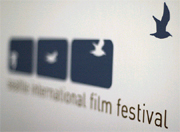Another Seattle International Film Festival has come and gone. And 25 days, 418 films, 22 US premieres and 19 world premieres later, the miracle-workers otherwise known as the 2006 SIFF staff and volunteers have my undying admiration. The thousands of tiny wonders they worked to prepare and execute a relatively hitch-free SIFF (the trafficking of 418 prints to eight venues is reason alone for awe) made for an amazingly tight and superbly coordinated festival. I attended 60+ programs and was hard-pressed to witness even a hiccup.
The programming was exceptional, too, with a strong documentary lineup continuing throughout the proceedings, picking up after mid-fest with the sad truths conveyed in Who Killed the Electric Car? (a fascinating question whose sobering answers include: legislators, big oil, auto manufacturers, and you). The World According to Sesame Street is a touching look at incarnations of the beloved children’s show in some of 120+ other nations, with narrative drive provided by a compelling behind-the-scenes account of the troubled creation of Bangladeshi Sisimpur. Other remarkable nonfic entries included TV Junkie, a harrowing look at the harsh cocaine-laced downward spiral of Texas newscaster Rick Kirkham told through seven years’ worth of his personal (and extremely revealing) video diaries; and The Last Communist, the tale of exiled Malayan leader Chin Peng told through current profiles of historic places and crazy-ass song-and-dance sequences in the form of old propaganda reels.
But the best documentary I saw, and a film that will surely make my best-of-the-year list, is the glorious and inspiring The Heart of the Game, which follows six thrilling seasons with a local high school girls’ basketball team called the Roosevelt Roughriders. It becomes the tough coming-of-age saga of star player Darnellia Russell, whose life on- and off-court just happens to have the fantastically surprising plot twists and nerve-jangling down-to-the-second game suspense of a great screenwritten story. The film is a joy and a triumph, and it’s in local theaters now for a post-SIFF run. Go see it.
The fictional dramas on view had no problem keeping up. Madeinusa, my other fest favorite, gives a fabulously original (and wonderfully fucked-up) take on urban/rural secular/religious culture conflict in its bare-bones story about an oblivious big-city gringo and the bizarrely devout Peruvian village in which he finds himself trapped; first-time writer/director Claudia Llosa is definitely one to watch. Other dramas of note included Iranian entries Gradually and The Fish Fall in Love, and, from Spain, Princesses, a beautifully-written and -performed story of the gritty life struggles of two struggling street putas. (It would have made an interesting double bill with the much lighter-weight Spanish moms-of-gay-sons dramedy Queens.)
None of this (including the Sesame Street doc) is kids’ stuff, but there were a variety of offerings this year that would, or should, count as “family-friendly”. Among the ones I saw were Eve and the Fire Horse (about an imaginative 1970s Vancouver girl caught between her family’s Buddhist traditions and a newfound interest in Catholicism; her mom is played by the great Vivian Wu, who also appeared in Danish Focus film Chinaman) and the delightful Kirikou and the Wild Beasts (brilliant French animator Michel Ocelot’s sequel to 2000 favorite Kirikou and the Sorceress).
The festival closed with The Science of Sleep, another surreal and intensely visual Michel Gondry film about the interplay of mental and physical realms. Gael García Bernal is great (and, in one brief moment, completely naked) as a head-in-the-clouds guy who returns home to Paris after the death of his father, soon to face a mundane job and a burgeoning relationship with his neighbor (lovely Charlotte Gainsbourg).
It’s no Eternal Sunshine or Being John Malkovich, but it served as a fitting end to a festival full of whimsical surprises.
